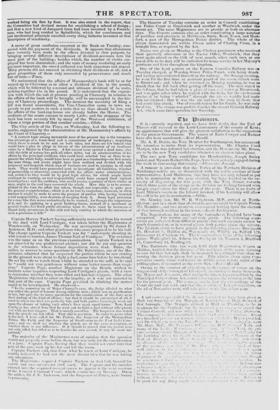A scene of great confusion occurred at the Bank on
Tuesday, con- nected with the payment of the dividends. It appears that alterations have recently been made in the offices devoted to that purpose, by bringing several different descriptions of dividend-accounts into the saute part of the building ; besides which, the number of clerks em- ployed has been diminished ; and the state of money rendering an early payment important, the crowd collected was both numerous and urgent. Many persons did not succeed in obtaining their dividends at all, and a great proportion of them only succeeded by perseverance and much loss of time.—Times.
We understand that the affairs of Hammersley's bank will be so far wound up to Christmas as to allow a dividend of 10s, in the pound, which will be followed by a second and ultimate dividend of 5s. more, making together 15s. in the pound. It is understood that the expedi- tion with which the suit at present pending in Chancery in relation to the affairs of the bank will be brought, will be unexampled in the his- tory of Chancery proceedings. The moment the necessity of filing a bill was found unavoidable, the Vice. Chancellor came to town ex- pressly to put matters in such a train that no time should be lost, and the affairs of the banking-house are already before the Master. The creditors of the estate amount to nearly 1,200; and the stoppage of the bank has been severely felt by many of the West-end tradesmen, of whom a large portion of that number consists.—Globe.
The City article of the Times, on Wednesday, had the following re- marks, suggested by the administration of Mr. Hammersley's affairs by the Court of Chancery- 64 A current topic among mercantile men of the present day is the compara- tive advantage of a trust-deed and a commission of bankruptcy ; respecting which there is much to be said on both sides, but there are few indeed who would have a plea to allege in thvour of the administration of an insolvent estate by a Master in Chancery. A fiat cannot issue against a dead man, who with the debt of nature has paid all other debts, but an administration of his affairs by the principal creditors, who could have selected two or three to re- present the whole body, would have been as good as a trusteeship—in fact nearly the same thing, and assets might have been realized and divided with the judgment and despatch which men of business are used to .exercise in all such cases. They would have proceeded next to investigate all liabilities, whether of partnership or otherwise, connected with the affairs under administration; and, assisted as they would be by good legal advice, for which ample funds could not be wanting, no real responsibility could have escaped their vigilant investigation; and the creditors, who would receive a portion of their claims at once, might in the end have recovered the whole. How this is to be accom- plished in the turn the affair has taken, though not impossible, is quite past the general comprehension; which is at no loss to conjecture, however, in what manner it might be made to serve the purpose of parties who, having incurred a real responsibility, were desirous of escaping from it. Some legal provision for a case like this seems undoubtedly to be wanted; for though the importance of it, and its applying to a great banking-house, instead of a merchant or general trader, has fixed public attention upon it, there must be instances of almost daily occurrence in this rich and busy country in which the omission of such a provision is felt."


























 Previous page
Previous page